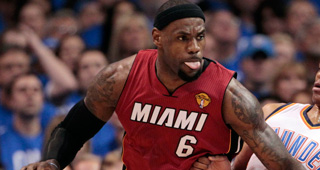For all the drama in the final minutes of Game 2 of the NBA Finals, the first few were the real story. The Miami Heat raced out to a 18-2 lead, creating a massive buffer they used to hold off the Oklahoma City Thunder in a 100-96 victory.
"That was the game. We can't start off that slow, especially at home," said Kevin Durant.
Erik Spoelstra made a critical adjustment between Games 1 and 2, moving Chris Bosh back into the starting lineup in place of Udonis Haslem. With a starting frontcourt of Bosh, LeBron James and Shane Battier, Miami spread out the Oklahoma City defense, creating driving lanes for their stars and open jumpers for their role players.
Because LeBron and Dwyane Wade are more comfortable attacking the rim than shooting from the perimeter, floor spacing is vital to the Heat's offense. That's why Miami has been playing only one big man since Bosh's injury in the second round, as an extra perimeter shooter brings two players out of the paint and gives LeBron and Wade more room to finish or pass out of a double-team.
And with Bosh on the floor instead of Haslem, who has struggled with his jumper throughout the postseason, Oklahoma City can't cheat off any of the other three Miami starters. Bosh's ability to space the floor at 6'11, 235 and occupy the opponent's best frontcourt defender away from the basket completely changes the Heat's offense.
"[Starting Bosh] spreads the floor. It gives us more gaps to get to the paint," said Wade. "We're glad he's back to playing his regular minutes; that's going to be key for us the rest of the way."
Almost as important as his jump-shot is his offensive rebounding ability, since Bosh's 7'3 wingspan and soft touch make him far more dangerous on the offensive glass than the Heat's more offensively-limited big men. Serge Ibaka can't stay attached to Bosh when he is roaming defensively, and Bosh took advantage with seven offensive rebounds in Game 2.
But, as dangerous as he is offensively when he is playing as a center, he’s nearly as vulnerable on the other end of the floor. He doesn't have great lower body strength or lateral quickness, and a Bosh, Battier and LeBron frontline doesn't have a defensive anchor in the low block.
Unfortunately for the Thunder, none of their big men can consistently score with their back to the basket. Posting up Kendrick Perkins, a 6'10, 270 defensive specialist, plays right into Miami's hands, even when he’s being defended by the much smaller Battier. Despite playing only 20 minutes, Perkins still led the team with three turnovers.
His post defense was essential to eliminate Andrew Bynum and the Lakers in the second round, but there's no real place for him on the floor in The Finals. He's a non-factor offensively and he doesn't have the same foot-speed as Ibaka or Nick Collison to help and recover on the Heat shooters. In essence, he's an elite cornerback playing against a triple-option offense which only passes 3-5 times a game; his skill-set just isn’t very useful in this series.
Offensively, he affects the game in precisely the opposite way Bosh does, allowing Miami to clog the lane and force Oklahoma City to take contested jumpers. Battier liberally helped off of Perkins, which allowed him to get in position for his favorite defensive move: running across the lane in order to instantly fall to the ground.
In the fourth quarter, with Perkins on the bench, the Heat’s small-ball lineup wasn’t nearly as dominant. Instead, when playing lineups that featured James Harden and only one big man, Oklahoma City spaced the floor as effectively as Miami, resulting in a thrilling finish where Durant had an open 10-foot shot to tie the game in the final moments.
In the 2011 NBA Finals, the Dallas Mavericks beat the Heat by playing through their two 7’0; in the 2012 Finals, for the first time, Miami is facing an opponent with the talent to beat them at their own game. But, in a series this close, the Thunder are going to have a hard time winning three more 50/50 games if they continue playing from behind like they did in Games 1 and 2.
Yet, instead of focusing on the match-up difficulties Spoelstra's adjustment gave his team in the first quarter, Scott Brooks pinned their slow start on intangibles: "I just think we were missing shots. We didn't come out with the defensive toughness, the disposition that we need to play with. We have to do that first, and then if it doesn't work, we'll think about [changing our starting line-up]".
In a championship series, basketball games are decided by the individual matchups on the floor and the adjustments coaches make to their lineups to exploit them, not by who tries the hardest or who wants to win the most. At this level, in the biggest games of their lives, everyone is coming out ready to play. Effort isn’t the issue; execution is, and that depends in large part on the personnel the coach puts on the floor.
If Oklahoma City is going to regain control of the Finals, Brooks will have to adjust to Spoelstra's adjustment and tweak his starting lineup. Do that and the "disposition" he wants will take care of itself.

Jonathan Tjarks wrote on the NBA for RealGM from 2011-2016 before joining The Ringer.
Follow @JonathanTjarks on Twitter.


